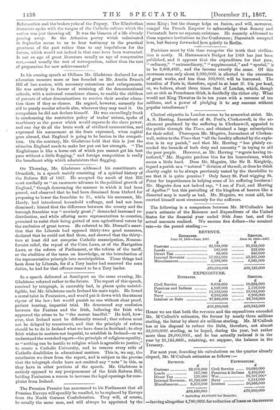In a speech delivered at Southport on the same evening,
Mr. Gladstone referred rather to the future. The report of this speech, received by telegraph, is execrably bad, in places quite unintel- ligible, but Mr. Gladstone made Ireland his main topic. He found a moral taint in Fenianism, and would put it down with the utmost rigour of the law ; but would punish no one without clear proof, patient hearing, impartial trial. He denounced any confusion between the Fenians and the Irish, believing the Irish who approved the crime to be " the merest handful." He held, how- ever, that Ireland must be differently treated ; that reform must not be delayed by resentment, and that the principle of reform should be to do in Ireland what we have done in Scotland ; to obey Irish wishes in matters not imperial, to establish in Ireland—as we understand the wretched report—the principle of religious equality, as " nothing can be hostile to religion which is agreable to justice;" to create a Catholic University, and to remove every relic of Catholic disabilities in educational matters. This is, we say, the conclusion we draw from the report, and is subject to the proviso that the telegraph clerks have not omitted any " note " in this, as they have in other portions of the speech. Mr. Gladstone is entirely opposed to any postponement of the Irish Reform Bill, holding Fenianism a reason to increase the legal openings for com- plaint from Ireland.






































 Previous page
Previous page